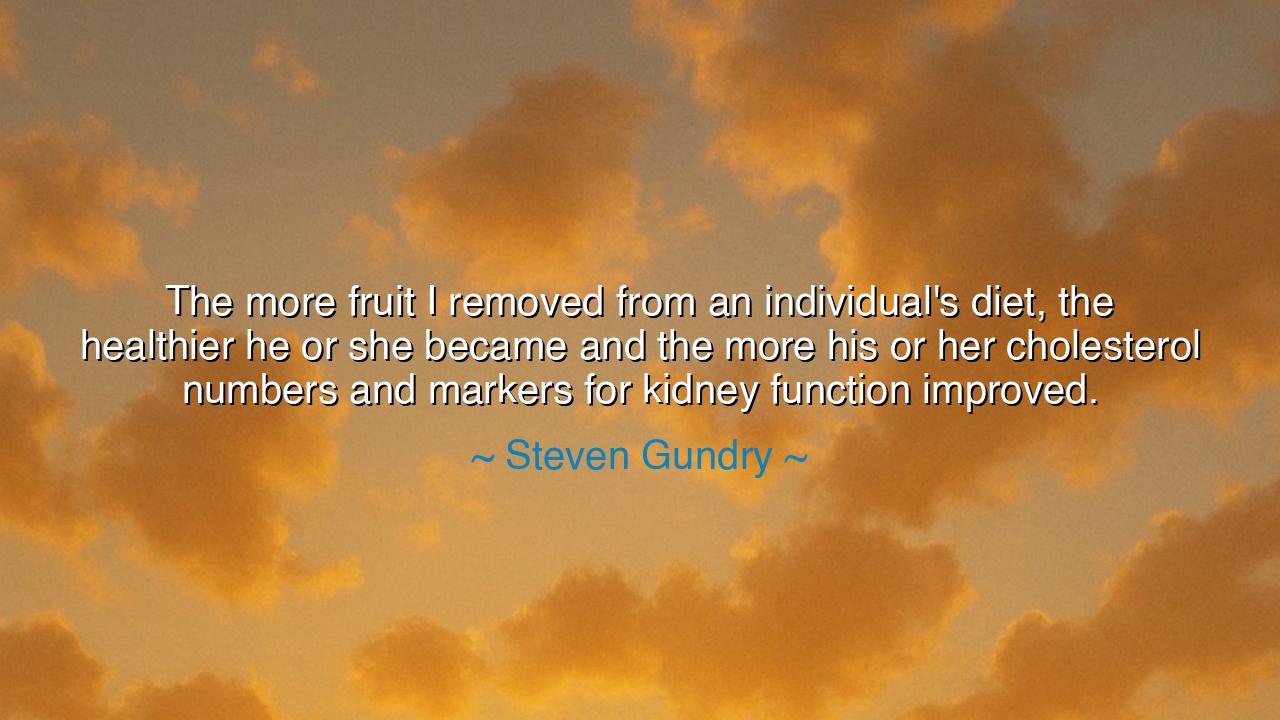
The more fruit I removed from an individual's diet, the healthier
The more fruit I removed from an individual's diet, the healthier he or she became and the more his or her cholesterol numbers and markers for kidney function improved.






"The more fruit I removed from an individual's diet, the healthier he or she became and the more his or her cholesterol numbers and markers for kidney function improved." These words, spoken by Steven Gundry, speak to a radical truth about the nature of food and its relationship with our health—a truth that, like the wisdom of the ancients, challenges conventional beliefs and calls us to rethink what we accept as nourishing. In a world where fruits are often regarded as a symbol of health, Gundry’s observation upends this idea, suggesting that even the most common foods, when consumed in excess, may not always serve our best interests. This is a profound reflection on the balance required in nourishing the body, and it beckons us to look deeper at what truly sustains us.
In the ancient world, there were philosophers and healers who understood that the relationship between food and health was not simple, and it was not one-size-fits-all. The great Hippocrates, considered the father of modern medicine, said, "Let food be thy medicine and medicine be thy food." He recognized that not all foods were equal in their ability to nourish and heal. Much like Gundry's observation, Hippocrates understood that moderation, not excess, was key to a healthy life. Just as one might find the balance between light and dark, so too must one find the right balance in their diet to maintain harmony in the body and mind. The ancient Greeks were well aware that food must not just be nourishing in the moment, but sustaining for the long journey of life.
Consider the example of the Spartan warriors, who were known for their strict and disciplined training, both in body and mind. Their diet was intentionally simple, focused on sustaining them for battle rather than indulgence. The Spartans understood that strength did not come from excess, but from the careful choice of what they consumed. Their meals were not centered on abundance but on nourishing the body for its ultimate purpose: to be strong, clear-headed, and prepared for the trials of war. It was through this balance that they became formidable in battle, for they knew that a body that was too burdened by excess would be sluggish, weak, and ineffective. In the same way, Gundry’s removal of fruit from his patients' diets can be seen as an effort to remove excess, focusing instead on what supports true health and vitality.
The lesson here is not that all fruits are bad, nor that they should be universally avoided, but rather that balance and moderation are the true pillars of health. Just as an overabundance of anything—be it food, wealth, or power—can lead to excess and disruption, so too can even the healthiest foods become burdensome if not consumed in the right amounts and at the right time. Gundry’s findings suggest that we must not cling to simple ideals of what is healthy, but instead, we must be willing to engage in the more complex task of understanding what our bodies truly need at any given moment.
Consider the wisdom of Leonardo da Vinci, a man known not only for his genius but also for his deep interest in the care of the body. Da Vinci believed in the balance between mind, body, and spirit, and his writings often reflect a keen awareness of the impact of diet on overall health. He knew that what we consume directly influences not only our physical state but our mental clarity and ability to create. Da Vinci’s commitment to maintaining this balance was not about deprivation but about conscious, mindful choices. It was in this mindful approach to his diet and lifestyle that he found the ability to sustain his creativity and productivity. Similarly, Gundry’s approach is not about restriction for its own sake, but about finding a better way to fuel the body so it can achieve optimal health.
In our own lives, we must take heed of Gundry’s message and Hippocrates’ ancient wisdom: that moderation is the key to health and vitality. What we eat—be it fruit, meat, or any other food—must be considered not just for its immediate pleasure or superficial nutritional benefits, but for its long-term impact on our health. A balanced diet, carefully tailored to meet the needs of our bodies, is the path to a strong, vibrant life. This is a call to self-awareness in our food choices, a reminder to focus on what sustains us rather than what satisfies us in the moment.
Let us then approach our diet with a sense of mindfulness, recognizing that the foods we consume are not mere sustenance but are the building blocks of our health. We must ask ourselves: are we nourishing our bodies in a way that supports not only our present desires but also our long-term well-being? As Gundry and the great thinkers of the past have shown us, balance, moderation, and self-awareness are the keys to living a life that is not only healthy but truly vibrant. In this, we honor the wisdom of the past, the complexity of the present, and the strength of our future.






AAdministratorAdministrator
Welcome, honored guests. Please leave a comment, we will respond soon